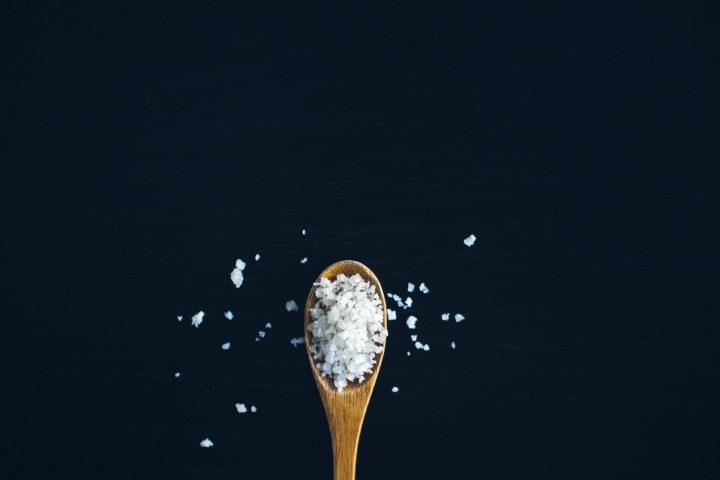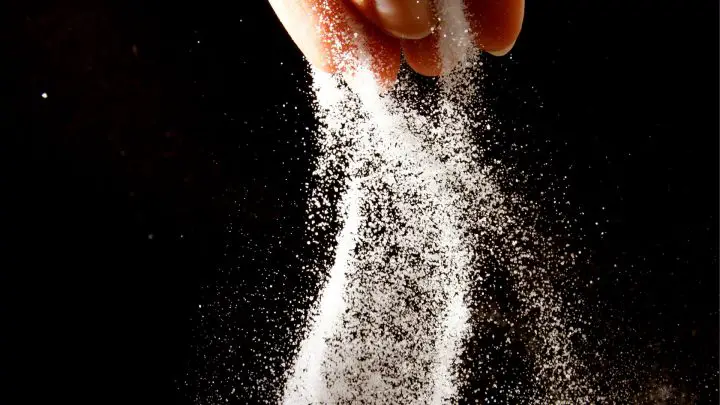When it comes to sourdough bread, there are many ways to enhance its unique tangy flavors. Salt in sourdough bread is probably one of the most common, and effective addition to most recipes. If you’re wondering how much salt to add, then stick around for the guide. Here’s my guide on sourdough salt percentage you can use!

Table of Contents
- The Role Of Salt In Sourdough Bread
- When To Add Salt To Sourdough Bread
- How Much Salt Should You Add To Sourdough Bread
- Do You Need Special Salt For Sourdough
- What Happens If You Don’t Put Salt In Sourdough?
- Sourdough Salt Percentage
- Sourdough Salt Percentage FAQs
The Role Of Salt In Sourdough Bread
Salt plays an important role in sourdough baking. There are many reasons why sourdough bakers choose to add salt to their sourdough recipes.
- Salt is mainly added for flavor.
- Salt helps develop the gluten in sourdough, and is essential for good oven springs.
- Improves fermentation.
- Allows your bread to brown in the oven.
- Preserves the bread.
Does Salt Kill Yeast in Sourdough Bread?
Not at all. If that happened, your dough won’t rise at all and produce that perfect oven spring.
Salt is an important element of bread, whether it is sourdough bread dough or commercially yeasted bread.
Salt slows down fermentation, though not nearly enough to affect the rise of your dough. It also regulates yeast activity, so that fermentation doesn’t happen too quickly.
While we all prefer quick fermentation, slowing it down isn’t all bad either, as it gives your bread time to develop its flavors.
The addition of salt also prevents the yeast from using all of the sugars, meaning that there are sufficient sugars available once your dough is ready for bread baking. This also ensures that your bread develops a wonderful, brown crust.
Without salt, you might end up with a pale and underdeveloped crust.
Does Salt Affect Sourdough Starter
No. Salt does not kill your sourdough starter, and if it did, your bread won’t rise. Albeit, there’s no reason to add it to your starter.
If you accidentally add some salt to your starter, simply discard and feed it with fresh flour and water as normal.
Salt won’t kill your starter per se, unless you continue to add it to your starter. In fact, it will simply slow your starter down.
Self-raising flour contains very less salt content, so if you feed your starter with self-raising flour, it won’t kill it. However, you might want to avoid doing it regularly.
When To Add Salt To Sourdough Bread
The best time to add salt to sourdough bread is at autolyze, followed by water, sourdough starter, and flour. If you prefer not to add salt at autolyze, you can simply add it just before you begin to stretch and fold the dough.

How Much Salt Should You Add To Sourdough Bread
The amount of salt added to sourdough is entirely up to you, and your personal taste. Though, you should try to use between 1-2%.
For instance, dough with 500g of flour, can include 5-15g of salt. Although you can reduce this to 5g if you feel that the salt will be too much for your liking.
Do You Need Special Salt For Sourdough
You don’t require any type of special salt for sourdough, rather you can use regular cooking salt from the grocery store.
However, if you’re looking to bake an extra special sourdough loaf, then you might want to opt for the extra special salt.
You can opt for naturally dried sea salt or flaked salt. This will beautifully enhance the flavor of your sourdough. The addition of salt helps preserve the color and flavor of the flour.
What Happens If You Don’t Put Salt In Sourdough?
If you forget to put salt in your sourdough, then here are a few things that might happen to your dough:
- Your dough will ferment faster since there’s no salt to control fermentation.
- It might over-ferment easily.
- Your dough won’t be as strong, as there’s no salt to support gluten strength.
- You could end up with a wet, sticky dough that’s difficult to handle.
- Your sourdough may not brown up in the oven, as the yeast will have used up the remaining sugars.
- Cooked sourdough won’t last long, without salt to preserve it.
- Your bread won’t taste like the delicious sourdough bread you’re used to.
Sourdough Salt Percentage
Don’t be afraid to add a small amount of salt to your sourdough. Salt adds flavor, and personality to your loaves, so sprinkle in moderation!
For more on beginner sourdough baking, check our my beginners sourdough recipe.
Sourdough Salt Percentage FAQs
What Percent Salt In Sourdough Bread?
The amount of salt you wish to add to your sourdough bread can be amended according to your taste. Ideally, you should use between 1-2%.
Is Sourdough High In Salt?
Not entirely, as the amount of salt will solely depend on the baker, and his or her preference.
What Is A Healthy Ratio In A Sourdough Culture?
The most common feeding ratio is 1:1:1, for instance, 40g sourdough starter, fed with 40g of flour, and 40g of water.






